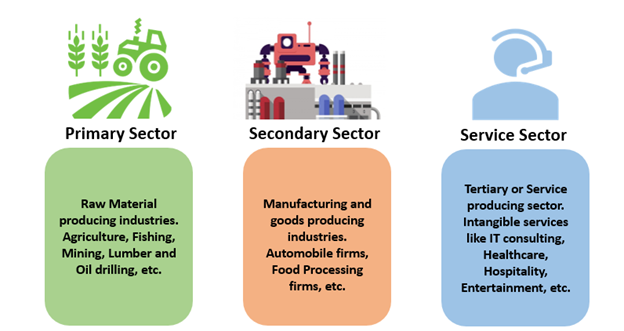What is service sector?
The service sector is the composite of all service industries in an economy. The industries falling under this sector offer services to the primary and secondary sectors. The service sector includes organisations in banking, information technology, retail trade and all professional services. This sector dominates developed economies while lesser developed economies are agrarian or dominated by secondary sector.
Highlights
- The service sector facilitates the progress of the primary and secondary sectors.
- The tertiary sector doesn’t’ produce tangibles; instead, it aids the production of tangibles in professional services.
- All essential services needed to run an economy like banking, education, healthcare, law, etc., are a part of the service sector.
Frequently Asked Questions (FAQ)
What is the role of the service sector in a 3-sector economy?
A 3-sector economy is made up of the following sectors-

Source: Copyright © 2021 Kalkine Media
The service sector is the tertiary sector that provides services to the primary and secondary sector firms.
It is a primary contributing sector, dealing in intangible activities. Recently, the service sector has developed and expanded rapidly. It works to increase the efficiency and effectiveness of goods produced by the primary and secondary sectors. The primary nature of all activities in the service sector is a facilitator. It employs a lot of human capital to fulfil the needs of the other two sectors and provide professional services to them.
What are the main features of the tertiary sectors?
- The service sector facilitates the progress of the primary and secondary sectors.
- The tertiary sector doesn’t’ produce tangibles; instead, it aids the production of tangibles in professional services.
- All essential services needed to run an economy like banking, education, healthcare, law, etc., are a part of the service sector.
Why is service sector Important?
The service sector is a crucial sector for the development of an economy. It is vital because the economy depends on its services. The factors which show its importance are listed below:

Source: © N.l | Megapixl.com
- Contribution to the net national product- The service sector is a significant contributor to most countries’ net national product (national income) as a significant part of the population is employed here.
- Facilitates industrialisation- Industries are dependent on the service sector for performance efficiency and improvement. Transport, electricity, banking is essential to any industry’s expansion.
- Magnifies agriculture- Agricultural activity is magnified with essential services like transport, marketing, etc. There is a big difference in the agricultural efficiency of countries with a well-developed service sector compared to those without it.
- Reduces regional inequities- Service firms provide a well-organised transport and communication network which connects all regions. It helps in expanding facilities in all regions of a nation.
- Market expansion- The service sector provides an opportunity to sell products in an expanded territory. Because of the service sector, goods produced in one region can be bought online and offline globally.
- Standard of living is improved- better services and access to banking, insurance, education, and health improve living standards, i.e. quality of life in a country.
- Productivity improvement- The service sector facilities include skilful and efficient production in primary and secondary sectors.
- Improved foreign exchange flow- as services help expand international trade, it also helps increase the foreign exchange flow.
What are the advantages of operating in the service industry?
- Businesses operating in the service sector are better placed to take benefits of communication and networking.
- It is not very challenging to sell the services as all businesses in the service sector are developed on the need of an existing customer.
- Organisations do not need a physical presence; they can be entirely online. It is less costly to set up a business in the service sector.
What are the examples of service sector industries?
Many businesses and industries make up the service sector. It is the largest sector of significant economies in the world.
The following are a few businesses from the service sector-
- Hospitality & tourism business- Offices of travel agents, ticket booking platforms, hotels, and restaurants, etc., all are a part of this industry. Museums, wildlife parks, concert halls, and art galleries are all included in this industry.

Source: © Andreypopov | Megapixl.com
- Information technology industry- anything related to computer software, from networks to service software, is part of this business segment. Cloud computing, artificial intelligence are all developments in this industry. Cybersecurity professionals and software consulting firms like Infosys are all examples of this type of business. For all social media businesses, online education platforms fall under the information technology industry.
- Media business- It includes the media and entertainment segment. Right from news to entertainment variety shows, all are a part of this segment. Radio stations, print media, television channels, etc., operate in this business segment. Website designers, video games creators, app developers, social media consultants, and graphic website designers are all professionals working in this industry.
- Banking and fintech (financial technology) businesses – all banks, payment applications, credit and debit card companies, and financial technology firms facilitating online receipts and payments fall under this umbrella.
Other service sector jobs include teaching, consulting, accounting, housekeeping, nursing, engineering, architecture, etc. Individuals employed in the service sector majorly deal in intangibles. Services often involve exchanging, storing, and processing information or fulfilling the needs of individuals and firms working in the primary and secondary sectors.
How has technology transformed the service sector?
Technology has taken the service sector to a new height. Information technology, data exchange and new developments like artificial intelligence and cloud computing have changed the way industries work. Businesses in the service sector are also rapidly increasing focus on knowledge of competitors and understanding of target customers to minimise operational costs. All sectors are adopting new technologies to boost production, upsurge efficiency, and remove operational inefficiencies. Even agriculture is improving with agri-tech services. Technology is thus, making economies increasingly dependent on the service sector.
 Please wait processing your request...
Please wait processing your request...